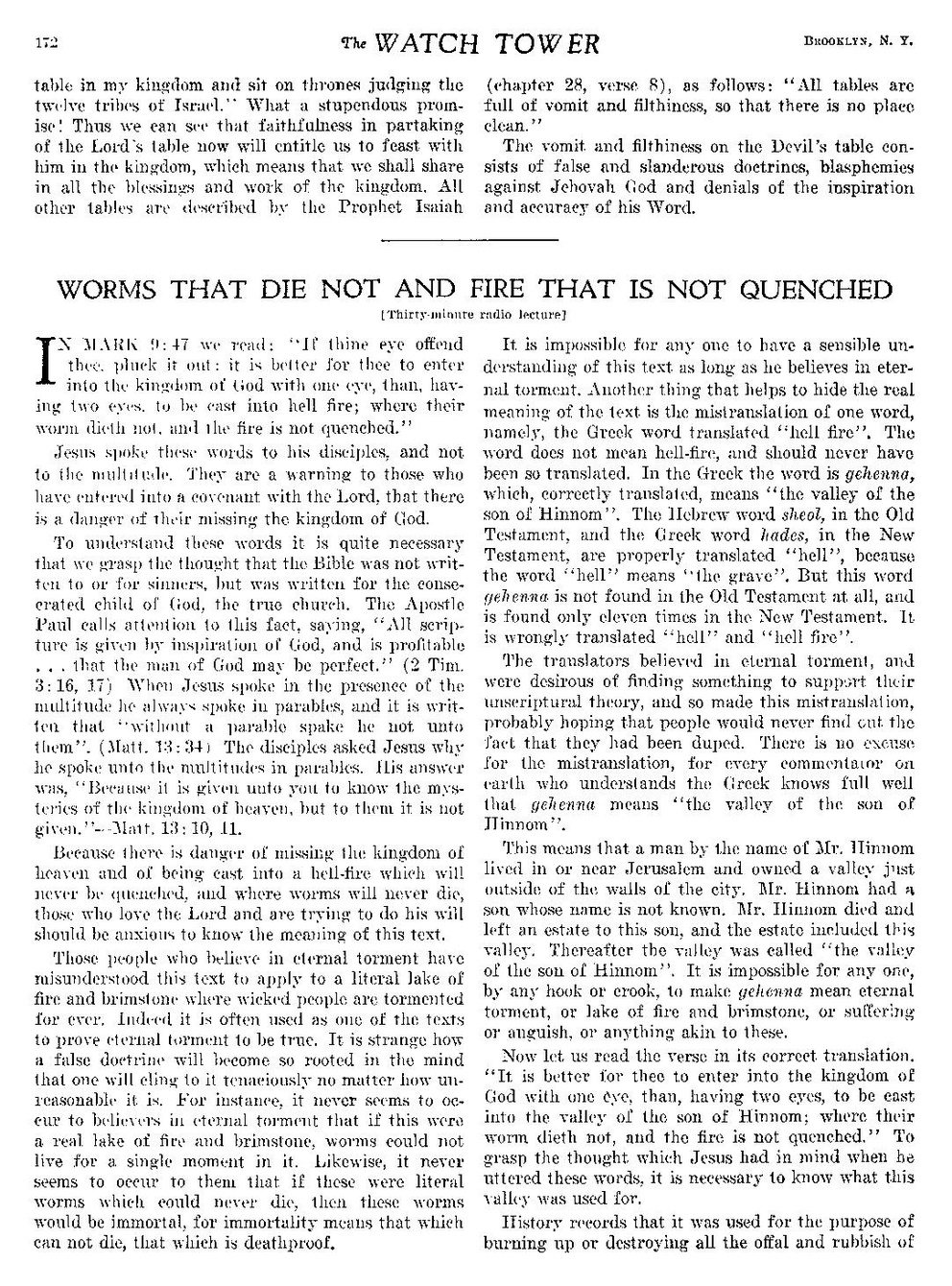1 -·)
,-
Cfhe
WATCH TOWER
tabh~
in m~' kingdom and sit on thrones judging the tribes of Israpl.·· "'hat a stupendous prom. ise! Thus we can see that faithfulness in partaking of the Lord's table now will entitle us to feast with him in the kingdom, which means that we shall share in all the hlc'ssing's and work of the kingdom. All other tabIt,,; are (ksclibed b~' thc Prophet Isaiah t,"('Jn~
BROOKLYN.
N. Y.
«('hapter 28, verse 8), as follows: "All tabll:'s arc full of vomit and filthiness, so that there is no place clean. " The vomit and filthiness on the Devil's table con· sists of false and slanderous doctrines, blasphemies against Jehovah God and denials of the inspiration and accuracy of his ,Vord.
WORMS THAT DIE NOT AND FIRE THAT IS NOT QUENCHED [Thirt~"lllinlHe
x
)LHK ~1:+7 we read: "If thinp E'ye offpud tJ1('(" pltH'k it ont: it i" better for thee to enter into the killgdnm of t;od with one eyp, than, having' two ('."ps. to ])(' ('ast into hell fire; where their worm di(,th Ilot. awl the fire is not quenched." Jesus spoke tll('s(' 'ords to his disciples, and not to the mult It wk Thp~' are a warning to those who ha'e (']1te1'(,<1 into a con'nant with the Lord, that there is a dallg-pr of thl'ir missing the kingdom of God, To undl'l'staml these words it is quite necessary that we gTasp the thought that the Bible was not writtl'n to or for sinllers, hut was written for the consecrated chil(l of' (;od, the true church. The Apostle Paul ca Us ntt l'llt ion to this fact, sa~'ing, "All scripture is gin'Jl b~' inspiration of God, and is profitable ... that the mun of God may be perfect." (2 Tim. 3: 16, 17) ,Yhen Jesus spoke in the presence of the multitude 1lC' a1'a."" spoke in parables, and it is writtPI1 that "wit hont a parable spake he not unto them". pratt. 1:3: 34) 'l'he disciples asked ,Jesus why hl' spoke unto the multitudes in parables. His ans'('r ,,'as, "Beeuusp it is giYl'n unto you to know the m~'S te1'ies of the kingdom of heawlJ. hut to them it is not gin'n. "~}la1t, 13: 10, 11. Bec'ame there is dang'er or missing' the kingdom of hean'n and of being cast into a hell-fire whic'h will Hen'r be quene]wu, aud wh('re worms will neyer die, those who Jove the; Lord and arc trying to do his will shoukl be anxiou,", to know the meaning' of this text. 'I'hose people who ]wlieye in eternal torment ha'e misunderstood thi" text to apply to a literal lake of fire and hrimstOlIP whNe wicked people arc tormented for eyer. Inde('d it is oft('n used as one of the texts to prow ('ternal torment to be true. It is strange how a false doetriIll' will hecome so rooted in the mind that one will cling to it tenaciously no matter how unreasonable it is, For instance, it neyer seems to ocCllr to beliewrs in eternal torment that if this w('re a real lake of fire and brimstone, worms could not live for a single moment in it. Likewise, it never seems to occur to them that if these were literal worms which ('ould newr die, then these worms would be immortal, for immortality means that which can not die, that which is deathproof.
I
radio lecture]
It is impossible for anyone to have a sensible un· derstanding of this text as long as he belieyes in eternal torment. Anot her thing that helps to hide the real meaning of the text is the mistranslation of one word, namely, the Greek word translated "hell fire". The word does not m('an hell-fire, and should never have be('n so translated. In the Greek the word is gehenna, which, correctly translated, means" the valley of the son of Hinnom". The Hebrew word sheol, in the Old Testament, and the Greek word hades, in the New Testament, arc properly translated "hell ", because the word "hell" means "the grave". But this word gehenna is not found in the Old Testament at all, and is found only eleyen times in the New 'l'estament. It is wrongly translated" hell" and" hell fire ". The translators believed in eternal torment, and were desirous of finding something to supp~)rt their unscriptural theory, and so made this mistranslat ion, probably hoping that people would never find cut the fad that they had been duped. There is no cxwse for the mistranslation, for every commentatOr on earth who understands the Greek knows full well that gehenna means "the valley of the son of Einnom' '. This means that a man by the name of :Mr. Hinnom liyed in or near Jerusalem and owned a valle~' j'lst outside of the walls of the city. 1'. Hinnom had 1 son whose name is not known. 1'. Ilinnom died and left an estate to this son, and the estate included tri" yalley. Thereafter the yalley was called "the valley of the son of Hinnom". It is impossible for any on(', by any hook or crook, to make gehenna mean eternal torment, or lake of fire and brimstone, or suffer:ng or anguish, or anything akin to these. Now let us read the verse in its ('orrect translation. "It is better for thee to enter into the kingdom of God with one <'~'e, than, having two eyes, to be cast into the yalley of the son of Hinnom; whE're their worm dietll not, and the fire is not quenched." To grasp the thought which Jesus had in mind when he uttered these words, it is necessary to know what this nl1h'~' was used for. Histor~' records that it was used for the purpose of burning up or destroying all the offal and ruhbish of
